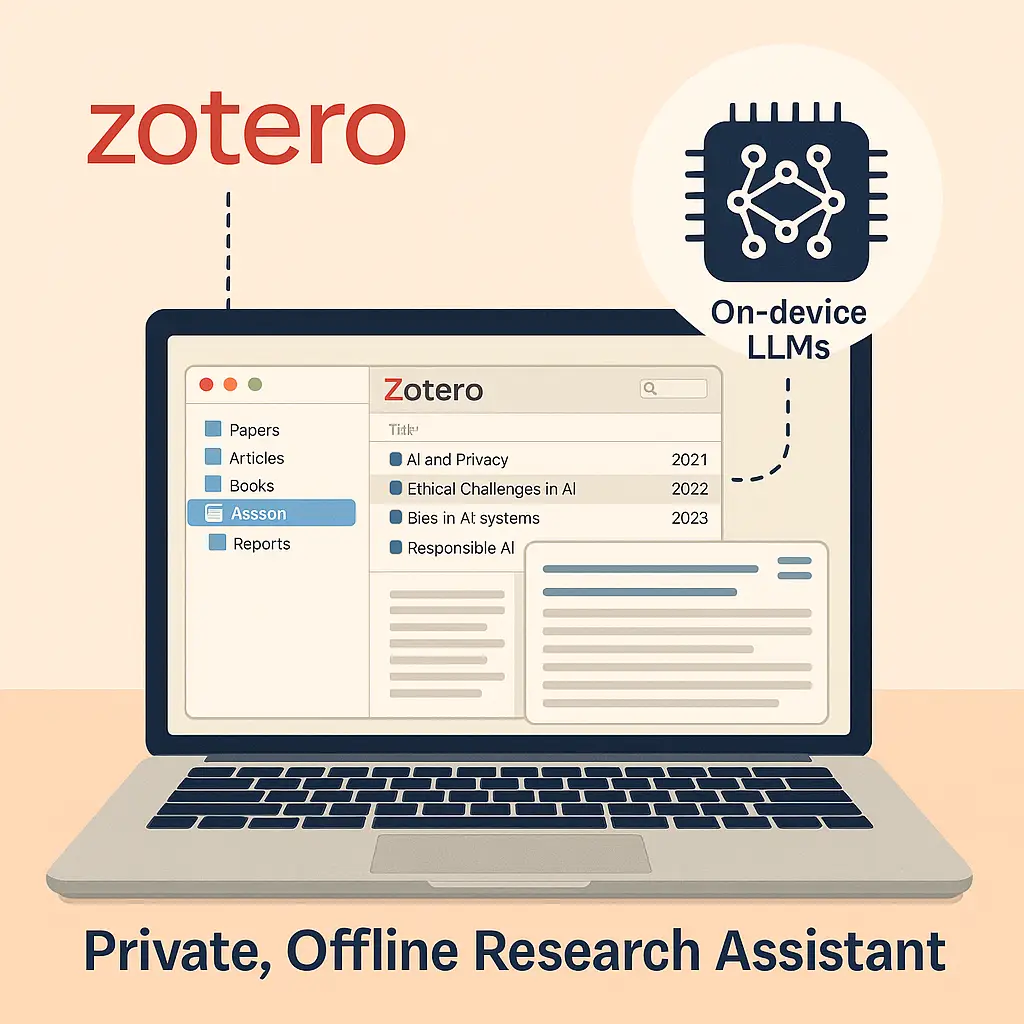Zotero + Local LLMs on macOS: A Private, Offline Research Assistant
In an era increasingly defined by digital dependence and cloud-based AI, the quiet power of local intelligence has returned — and nowhere does this resurgence shine brighter than on macOS. The combination of Zotero and on-device large language models (LLMs), powered by Core ML or llama.cpp, offers a revolutionary workflow: a private, offline, and lightning-fast research assistant for scholars, writers, and analysts.

A Paradigm Shift: From Cloud Reliance to Local Mastery
While cloud LLMs like ChatGPT and Gemini dominate public attention, they inevitably raise questions about data sovereignty, intellectual property leakage, and research confidentiality. In contrast, macOS’s local machine learning framework — Core ML, deeply integrated with Apple Silicon — enables private AI computation directly on the user’s device.
When coupled with Zotero, the open-source reference manager cherished by academics, this pairing becomes transformative. Zotero provides the structured research corpus: PDFs, notes, tags, and metadata. A local LLM acts as the semantic engine — summarizing, linking, and reasoning across that library without ever sending a byte to an external server.
Step-by-Step: Building Your Offline Research Assistant
1. Setting Up Zotero as Your Research Base
Install Zotero and configure it with the Zotero Better Notes and Zotero Better BibTeX plugins. These extend Zotero’s native capabilities for inline note-taking, markdown export, and citation consistency. Your Zotero library becomes a structured, queryable research database — ready for LLM interaction.
2. Installing a Local LLM via llama.cpp or Ollama
Both llama.cpp and Ollama enable Apple Silicon–optimized local inference of models such as Llama 3, Mistral, or Phi-3-mini.
- On macOS, install via Homebrew:
brew install ollama
ollama run llama3- Alternatively, compile llama.cpp with Metal acceleration for direct Core ML integration.
These models run natively, using your Mac’s Neural Engine or GPU — completely offline, with no telemetry or data upload.
3. Integrating Zotero with the Model
Use a Python bridge or Apple Shortcuts automation to let the model read Zotero exports (in JSON or Markdown). For instance:
zotero-cli export --format=json > mylibrary.jsonThen feed that data to your local LLM for tasks such as:
- Contextual summarization: “Summarize all papers tagged AI Ethics from 2023.”
- Thematic clustering: “Group my notes on cognitive bias by methodology.”
- Knowledge linking: “Find conceptual overlaps between Kahneman (2011) and Gigerenzer (2018).”
All processing remains on your machine — ensuring total privacy.
The Benefits: Quiet Power and Total Trust
| Feature | Cloud LLM | Local LLM + Zotero |
|---|---|---|
| Data privacy | Limited (server-side logs) | 100% local |
| Offline use | No | Full |
| Cost | Subscription-based | Free / one-time hardware cost |
| Latency | Network-dependent | Instant |
| Customization | API-limited | Fully modifiable |
| Integration with Zotero | Indirect (via plugins/APIs) | Direct (filesystem + local APIs) |
Researchers handling sensitive data — from unpublished manuscripts to patient interviews — gain a trustworthy assistant that operates entirely within their control.
Practical Applications
- Automated literature summaries: Generate topic summaries per collection for faster writing.
- Concept maps: Use embeddings from local models to visualize relationships across citations.
- Semantic note linking: Automatically interconnect notes by conceptual proximity.
- Draft generation: Produce structured outlines for grant proposals or review papers using your own library as source material.
Why macOS Leads the Local-AI Renaissance
Apple Silicon’s unified memory architecture and Neural Engine acceleration provide unmatched energy-efficient inference. Core ML 4+ natively supports quantized transformer models, meaning local inference is now both practical and elegant. macOS 15 (“Sequoia”) expands this ecosystem, enabling fine-tuning and embedding generation directly on-device.
In contrast to the opaque infrastructure of remote AI, local AI on macOS delivers a tangible sense of agency — you own the computation, the data, and the output.
Looking Ahead: The Scholar’s Private AI Lab
The fusion of Zotero and local LLMs redefines what “research infrastructure” means. Instead of externalizing cognition to distant servers, scholars can cultivate personalized, sovereign AI ecosystems tuned to their corpus, their language, and their ethical standards.
With just a few commands, your Mac transforms from a productivity tool into a cognitive companion — one that remembers, connects, and creates alongside you, without ever breaching your trust.
References:
Apple. (2024). Core ML documentation. Apple Developer. https://developer.apple.com/machine-learning/core-ml/
Kepner, J., et al. (2023). Efficient local inference using llama.cpp. arXiv preprint arXiv:2307.09288.
Zotero. (2024). Zotero user guide. https://www.zotero.org/support/
Ollama. (2025). Running local LLMs on macOS. https://ollama.ai/
